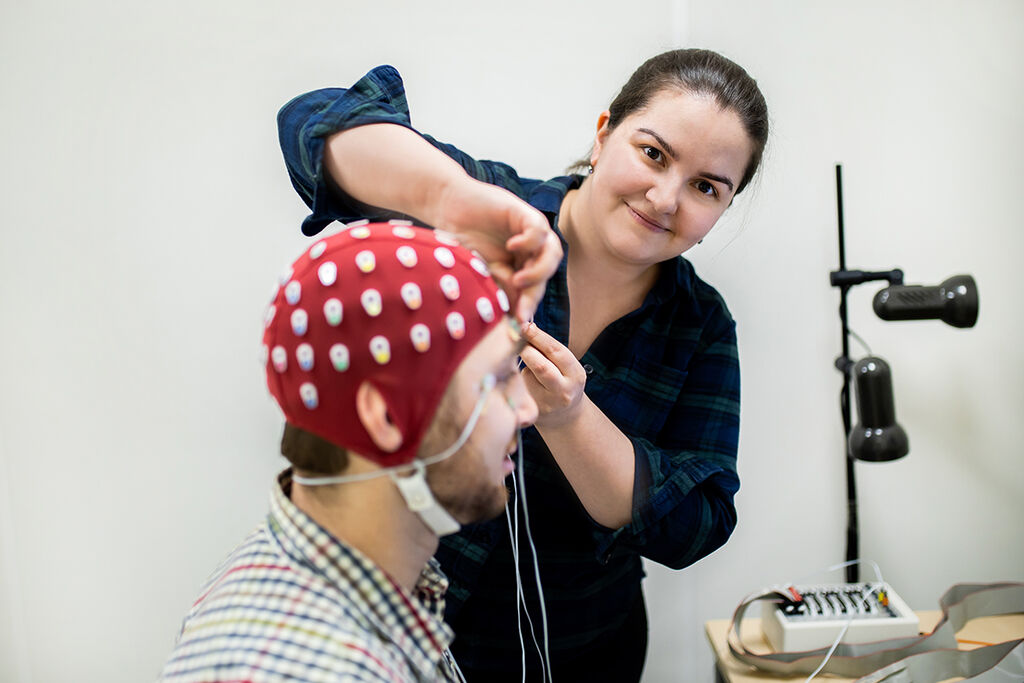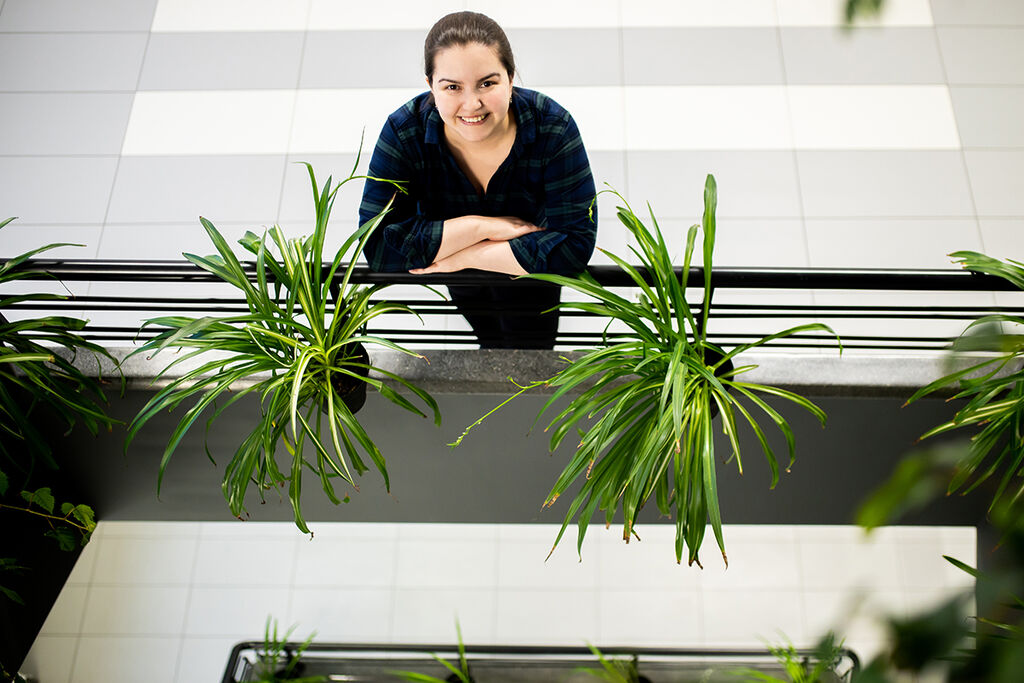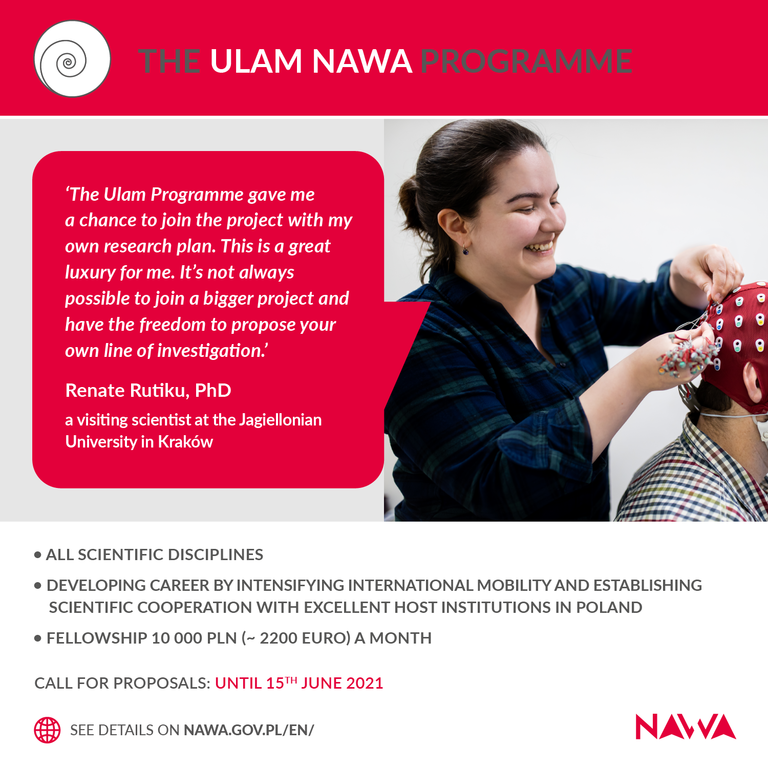‘The Ulam NAWA Programme gave me a chance to join the project with my own research plan. This is a great luxury for me. It's not always possible to join a bigger project and have the freedom to propose your own line of investigation,’ says Renate Rutiku, PhD, a visiting scientist at the Jagiellonian University in Kraków.
Estonian neuroscientist Renate Rutiku, PhD, a NAWA fellowship holder under the Ulam Programme, studies the connections between working memory and consciousness. She is currently pursuing her research at the Jagiellonian University in Kraków, Poland and, together with other scientists around the world, trying to determine whether differences in the human experience of consciousness are caused by differences in an individual's brain structure.

NAWA: Do you have a hypothesis about where consciousness is located in the brain?
Renate Rutiku: It's probably not located in only one part of the brain, but within a network of different areas. The bigger question is whether this network is more in the frontal cortex, or front of the brain, where functions related to cognition reside, or more in the sensory cortices, or back of the brain, where areas responsible for perception are located. There are many practical reasons for determining this. For example, in the case of patients with brain damage, when we are uncertain whether they are conscious or not. It would be significant to know which parts of the brain are crucial to being conscious and aware and not just alive. We hope that our data will clarify this.
Usually scientists studying the relationship between consciousness and the brain focus on brain activity. However, you and your colleagues focus on brain structure. How can you determine whether individual parts of the brain are involved in consciousness?
We want to collect data in three steps. First, we look at an image of the human brain in great detail. Then we send out questionnaires to participants. One typical question we ask is how vivid is your imagination. The third and the largest part involves different tests that need to be performed on the computer in our laboratory. The aim of these tests is to map different elements of visual ability and sensory performance, among others.
We do this research in collaboration with partners from labs all around the world: Europe, Japan, Australia, the US. They do similar large-scale data collection, so hopefully we'll end up with a really representative and statistically strong sample of data.
Why are you carrying out your project in Poland, instead of Japan or Australia?
Because of the C-Lab team at the Jagiellonian University. They have a unique approach to consciousness because they focus more on metacognition. Previously, I was working more on the sensory aspect. A typical experiment would involve, for example, flashing a picture on a computer screen, but sometimes the participant can see it and sometimes it is masked so they don’t. In both cases, you have early sensory processing of the stimulus, but sometimes
this process is conscious and other times not. In Kraków, researchers are also investigating the contribution of metacognition to consciousness. Metacognition is particularly important in moments when you are not sure whether something has happened. "Did I really see something?" Was there something there or not?" This metacognition also determines your conscious experience.
This is something that I have not worked on before and it represents a very interesting addition to understanding consciousness better.
When I was told about the project last year and heard that that C-Lab was looking for post-docs, I knew it was exactly what I was looking for because my research could become a part of a much bigger project and I would have many more opportunities to look at different aspects of consciousness.
If there was an open postdoc position, why did you decide to apply to the Ulam Programme?
The Ulam Programme gave me a chance to join the project with my own research plan. This is a great luxury for me. It's not always possible to join a bigger project and have the freedom to propose your own line of investigation. Often research plans are very fixed in terms of what has to be done and experiments are designed very precisely. So one of my main motivations in applying for the Ulam fellowship to join C-Lab was having the freedom to pursue my own scientific interests.
You have already done research in several institutes, including through the Max Planck Society. Can you compare these institutes in terms of working conditions?
The Max Planck Institutes might provide more access to technology, but there is also more demand for it and much more competition. Here in Kraków, the working conditions are also excellent in terms of access to computers, the EEG, and MRI, but everything is, I would say, less stressful. Also, our institute is near Kraków’s city centre, in a recently renovated building and next to a beautiful park. It is really enjoyable to work here. Of all the labs I have worked in, the one in Kraków is one of my favourites.
Thank you for your time.

Renate Rutiku is a neuroscientist at the University of Tartu. She studied psychology at the University of Potsdam and wrote her diploma thesis on conscious perception through the Max Planck Institute for Brain Research. She obtained her PhD at the University of Tartu after focusing on improving the methodological aspects of consciousness research. During her first postdoctoral fellowship in Milan, she studied auditory perception in patients suffering from consciousness disorders and how brain-based measures can inform us about an individual’s level of consciousness. In 2019, she received the Stanisław Ulam Research NAWA Fellowship and is currently pursuing her second postdoctoral fellowship at the Jagiellonian University.
Want to apply for the NAWA fellowship under the Ulam NAWA Programme? Call for proposals until 15th June 2021. Find more information HERE










